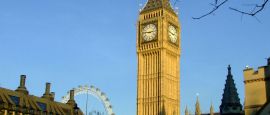England History, Language and Culture
History of England
Little is known of the country's pre-Roman settlers but it's believed that ancient Britons were a Celtic people who migrated to Britain by a now-submerged land bridge. The Romans first attempted to conquer Britannia (as they knew it) in 55 BC but it wasn't until 43 AD that Claudius successfully led an invasion.
Within years the Romans ruled the land, setting up cities, roads and spas. However, by the 5th century the Roman Empire withdrew from Britain, leaving the way clear for an influx of Anglo-Saxons and, later, Vikings. The Norman Conquest, initially marked by the Battle of Hastings in 1066, caused many Anglo-Saxons to flee. The Normans carried out a huge census of England, documented in the Domesday Book.
Of the many royal houses that subsequently ruled, it was arguably the Tudors in the 1500s that had the most profound impact. King Henry VIII broke away from Catholicism and created the Church of England, essentially in order to be granted a divorce. This decision had huge implications for England’s future and led to prolonged religious tensions.
Around a century later, the English Civil War saw dividing lines drawn up again, this time between parliamentary forces and royalist supporters. The war led to King Charles I's execution and left a framework for rule by parliamentary democracy, which remains today.
By the early 20th century the British Empire had become the largest in the world, with numerous overseas colonies. The onset of WWI and WWII signalled change, and by the 1950s Britain had begun to divest itself of its colonies. Post-war Britain looked very different, as many women came into the workforce for the first time. Significant social change also brought free healthcare, better housing and more access to education.
In the 'swinging 60s', London caught world attention through its music, fashion and culture as Twiggy, The Beatles and the Rolling Stones made headlines.
Tory Prime Minister Margaret Thatcher was a divisive figure in the 1980s, polarising opinion with her measures to tackle England's economic woes. Tony Blair's Labour party came to power in 1997 promising change, but his tenure was tarnished by his support of a US-led war with Iraq.
The last decade has seen a shifting political and economic landscape, with the effects of the global financial crisis still reverberating. In 2016, England voted to leave the EU in a referendum colloquially known as Brexit. The process divides the country but is still undergoing.
Did you know?
• Only six people died in the Great Fire of London in 1666.
• The Cornish pasty is said to be worth £300m annually to the Cornish economy.
• London was reportedly the first city on the planet to reach a population of one million, a figure it reached in 1811.
• The Liverpool and Manchester Railway, which opened in 1830, was the first fully timetabled rail service in the world.





 You know where
You know where